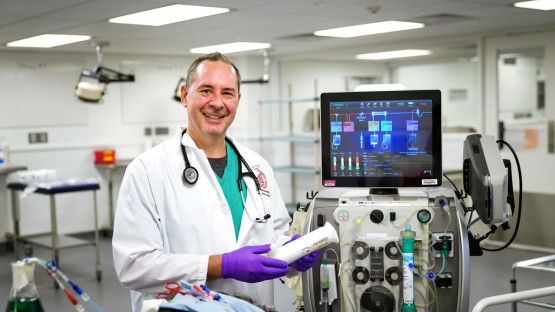Blood
Machine cleans blood of pets with kidney, immune diseases
The Cornell University Hospital for Animals has added a cutting-edge service for companion animals: a new technology capable of cleansing patients’ blood outside of their bodies. This opens the door to several new treatment options, including dialysis for animals with kidney failure and immune-mediated diseases.
The new technology – an extracorporeal blood purification (EBP) unit – came online this spring for cats and dogs. Only about 35 other animal hospitals across the country have such capabilities. Cornell’s is the only one in the region; the nearest other facilities offering this technology are in New York City and Philadelphia.
“The ability to provide dialysis and other extracorporeal blood purification to the patients in the upstate New York region is a game changer for our veterinary hospital,” said Dr. Jethro Forbes, assistant clinical professor in the Section of Emergency and Critical Care. “Among other things, we can be your pet’s artificial kidneys for a few weeks while these resilient organs are given a chance heal.”
While a standard treatment in people, kidney dialysis is less common in veterinary practices due to the intensive training needed to establish and run the technology.
“It’s a smaller community of high-level practitioners, but it’s growing rapidly,” Forbes said.
An EBP unit improves the lives of animals in multiple ways. Dialysis for pets in kidney failure is among the most common; the unit essentially cleanses a patient’s blood of bodily toxins, much like an actual kidney. For animals whose kidneys cannot function normally, being put on dialysis could make a lifesaving difference.
Removing a toxin or drug from the bloodstream is another common use of an EBP unit. “Sometimes our pets get into things they shouldn’t, like medications or chemicals. For example, this machine can cleanse the blood of antifreeze or anti-inflammatory drugs in just a few hours of treatment, before the toxins can cause damage to your cat or dog’s organs,” said Forbes, who has worked with EBP units in previous work at private specialty practices across the United States.
When an animal’s immune system isn’t functioning properly, this technology can also help manage it through an EBP therapy called therapeutic plasma exchange. One particular disease, immune mediated hemolytic anemia, results in immune system destruction of the body’s own red blood cells. Such a severe, life-threatening illness requires extensive hospitalization and specialty-level care, including immune-suppressing medication and blood transfusions. Therapeutic plasma exchange can actually remove dangerous elements of the malfunctioning immune system by exchanging the pet’s plasma using an extracorporeal filter, weeding the attackers out.
“The animal will still need standard care with medications, but this therapy removes the immune system’s weapons to give those medications the best chance at making a difference,” Forbes said.
Possibilities for expanding the EBP unit’s capabilities include configuring it for more species, such as horses, pigs and goats, or using different components that could clear a patients’ blood of bacteria and viruses. With the right materials, this unit could even assist in cutting-edge cancer therapies and bone marrow transplants.
Said Forbes: “It’s exciting to see what’s on the horizon. Right now, we’re thrilled to be able to offer this treatment for dogs and cats at Cornell, while also training the next generation of veterinary specialists to provide this care to even more pets.”
Melanie Greaver Cordova is director of communications and client relations for the Cornell University Hospital for Animals.

